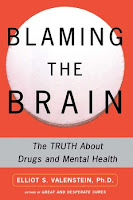Linda Gask, who I have mentioned before (see eg.
previous post), has reviewed
Conversations in critical psychiatry (2024) edited by Awais Aftab (see
her review and eg. my comment about the book in a
previous post). As she says, reading the book reminds her of when she first tried to make sense of psychiatry in her training. Such an experience of trying to make sense of psychiatry in the wake of the so-called anti-psychiatry of the time was common for our generation of psychiatrists (see eg. my MIA radio
interview). For example, I've mentioned before (see eg.
previous post and
my article) Simon Wessely's description of how he went through this process and was rescued by the book
Psychiatry in dissent (1976) by Anthony Clare. As I said in my comment about Awais's edited book, there is a sense in which his book is trying to rescue psychiatry from the more recent critical psychiatry movement, in the same way as Clare did with anti-psychiatry.
As Linda says, she has "never identified with the British version of ‘critical psychiatry’, finding it rather like having to adopt a complete ideology that will only consider hypotheses that are self-confirmatory". I'm not exactly sure what she means by this. If critical psychiatry's ideology is so self-confirmatory, why don't more psychiatrists and people in general go along with it? As I've said several times (eg. see previous post), critical psychiatry has found it very difficult to get its message across. Nonetheless I agree with Linda's conclusion to her review that:-
We need to encourage those training to be psychiatrists to not only be more thoughtful but listen to as many patients’ stories as they can and read widely, even the work of those they are convinced they will disagree with.




